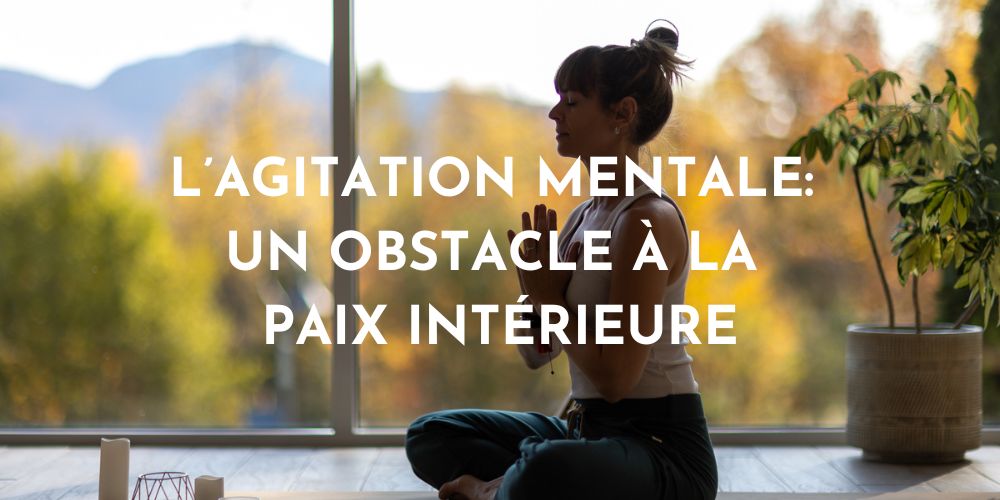By Madeleine Arcand
Meditation teacher and author

Meditation, far from being an esoteric practice or a passing fad, has become an essential tool for many people seeking to better understand their minds. While it may seem difficult to adopt at first, particularly because of the profusion of thoughts that invade us as soon as we try to settle into silence, the long-term benefits of this practice are undeniable. But how can we understand the benefits of meditation? And above all, how can we successfully integrate it into our hectic daily lives?
Why meditate? The quest for clarity and inner well-being
The first question we often ask ourselves is: why meditate? For some, the answer seems obvious: meditation allows us to calm down, refocus, and gain perspective from the hustle and bustle of everyday life. But what makes it truly valuable is that it offers much more than that.
1. The quest for inner clarity
Meditation allows, above all, to give yourself the opportunity to know yourself better. Mental clarity is one of the main benefits of meditation. Indeed, when you practice regularly, the mind calms down and you can then observe your thoughts and emotions with more distance. This allows you to gain a better understanding of yourself: who you are, what you want, and your deepest values.
It may seem paradoxical: by stopping actively thinking, we gain a better understanding of the world around us, but it is precisely this pause that allows the mind to rest and reveal profound truths. For example, many meditators realize that they were too caught up in the spiral of productivity, external expectations, and social comparisons. By meditating, they learn to return to what is essential: their own presence.
2. Managing inner turmoil
Meditation can seem like a difficult task, especially at first. All it takes is sitting down, closing your eyes, and breathing deeply, but the reality is that our mind is like a sky buffeted by constant clouds. These clouds are our incessant thoughts, our worries, our daily concerns. If we don't pay attention to them, they accumulate and become increasingly overwhelming.
So, one of the reasons it's difficult to meditate at first is that our brains aren't used to inactivity. We're conditioned by a lifestyle where busyness, anticipation, and productivity are omnipresent. But as we meditate, we learn to better manage this busyness and create moments of calm and silence.
3. Overcoming internal isolation
One of the main discoveries a regular meditator makes is that they are often locked into a worldview in which they perceive themselves as separate from others. This feeling of loneliness or isolation can lead to stress, anxiety, and even depression. Meditation allows us to break away from this vision of " separation," the other versus me. By observing the natural flow of thoughts, emotions, and even breathing, we become aware that everything is interconnected. This opens a space of compassion, not only for ourselves, but for others.

The benefits of meditation: a lasting effect on body and mind
The benefits of meditation are numerous and manifest in different aspects of our lives. Whether physical, mental, or emotional, the effects are generally gradual and long-lasting. Here are some of the main benefits you can expect from this practice.
1. Reduce stress and anxiety
Meditation has been shown to help reduce levels of the stress hormone cortisol in the body. By practicing mindfulness or other forms of meditation, the mind learns to detach itself from its thoughts by focusing its attention on a specific element (breath, physical sensations, ambient sounds) that is in the present moment. This prevents us from “jumping” from one thought to the next, which calms the nervous system.
2. Develop joy and contentment
If there is one essential virtue that meditation cultivates, it is undoubtedly that of inner joy . Unlike a joy that depends on external events—social interactions, professional successes, or the weather—meditation invites us to discover a deeper, more grounded type of joy, one that does not fluctuate with the circumstances of our lives. For example, some meditators discover that when they take the time to focus on small, simple pleasures, such as listening to the sound of rain or savoring the sound of the wind in the trees, they are able to experience a deep, almost magical form of contentment . It is not a joy brought about by external things, but a joy that arises from paying attention to the small details of life. This contentment, this feeling that what is there is enough , becomes a source of constant happiness.
3. Cultivate presence
In everyday life, it's easy to get caught up in the endless pursuit of external satisfaction. We all have those moments when we feel dissatisfied with our circumstances, when we yearn for an ideal of beauty, wealth, or social recognition that always seems out of reach. However, meditation offers a different perspective. By helping us cultivate presence , it allows us to discover that it is possible to be happy with what we have, here and now, and that joy does not depend on external factors, but on our ability to fully appreciate the present moment.

Mental agitation: an obstacle to inner peace
However, one of the biggest challenges faced by those new to meditation is first managing mental agitation . At first, it is common for the mind to be overwhelmed by an endless stream of thoughts, analyses, and concerns. We are constantly bombarded with information, worries, and urgent priorities. This daily environment of stress and distraction makes meditation difficult because it invites us to stop and settle down, when our natural tendency is to be in constant movement.
The practice of meditation, then, is about creating an inner space in which we can observe this flow of thoughts without identifying with them. Rather than getting carried away by the mental turmoil, we learn to detach ourselves from it and simply observe . By cultivating this ability to step back, we develop a better understanding of our internal workings. Gradually, we learn to recognize those moments when our minds wander in unhelpful directions, and to return to the present moment. This ability to refocus can be extremely liberating, as it allows us to see our thoughts not as absolute truths, but as fleeting moments .

Learn to release mental agitation and attachment to suffering
It's also essential to understand that the practice of meditation isn't about detaching ourselves from everything or ignoring life's difficulties. On the contrary, meditation can offer a fresh perspective on our trials and suffering. One of the central ideas of Buddhism, for example, is that we can learn to detach ourselves from our suffering by looking at it differently, without becoming overly attached to it.
The meditator does not aspire to a problem-free life, but rather to a serene presence in the face of these problems . He learns to release attachment to suffering, to cease identifying with it as a part of his identity. For example, one meditation teacher evokes the image of an individual suspended over an abyss, who could fall at any moment, but who chooses to pick up a strawberry and savor it in the present moment. It is a beautiful metaphor for how we can, even in moments of tension or crisis, find pockets of freedom by allowing ourselves to experience simple moments of presence.
It's not that meditation solves all problems, but it does give us the tools to approach them in a calmer, more creative way , less dominated by fear and agitation. We can then return to our problems with greater clarity, compassion, and creativity .
Mindfulness: A tool for responding with discernment
One of the greatest benefits of meditation is the ability to develop mindfulness . This means being more aware of our thoughts, emotions, and reactions as they arise. Instead of reacting impulsively, regular meditation practice allows us to step back and see things as they are .
This has concrete effects in daily life. For example, when we find ourselves in stressful or frustrating situations, we can more easily identify emotional triggers and choose to respond in a calmer and more thoughtful manner. A simple "I let myself go" becomes an awareness. We are no longer blindly swept away by the spiral of negative emotions, but we have the ability to stop, breathe, and regain control of the situation with greater serenity and discernment .

Meditation, a practice of subtle transformation
Thus, meditation is not a quick fix, but a subtle but profound transformation practice . It allows us to develop essential qualities such as inner joy, mindfulness and compassion. While meditation may seem difficult at first, over time it becomes a true tool for inner liberation , helping us navigate life's challenges with greater clarity, calm and acceptance. By gradually integrating these moments of presence and mindfulness into our daily lives, we discover a new relationship with ourselves and the world , a relationship that is more serene and more aligned with our true needs and aspirations.



2 comments
Bonjour Madeleine, merci de partager avec nous les notions et enseignements que tu as appris au cours de ton parcours. Je me posais la même question que Valérie Latreille (dans un
Commentaire précédent) concernant le reportage à découverte sur les risques de la méditation. Moi aussi je n’étais pas au courant qu’il y avait de méfaits. J’aimerais savoir ce que tu en penses. Ce que je crois est que ces gens auraient des prédispositions. Peut-être qu’ils auraient eu les même résultats mais à un autre moment dans leur vies.
Bonne journée
Au plaisir de te lire ou t’entendre sur le sujet
Anne
Allô Madeleine
Je me demandais ce que tu pensais du reportage de radio Canada sur les risques de la méditation…. Je médite depuis longtemps, mais je n’étais pas au courant des risques… je ne savais même pas que c’était risqué… troublant…. J’adore méditer mais on dirait que ceci vient de me faire peur. Et toi? Merci!;)